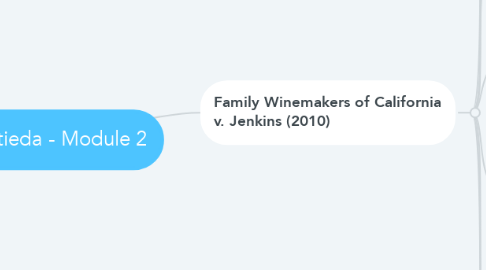
1. Family Winemakers of California v. Jenkins (2010)
1.1. FACTS
1.1.1. Parties
1.1.1.1. California winemakers
1.1.1.2. Jenkins of Massachusetts
1.1.1.2.1. Head of the Massachusetts Alcoholic Beverages Control Commission
1.1.2. What happened
1.1.2.1. Local wineries in Massachusetts can distribute products in 2 different ways
1.1.2.1.1. 3 tier system
1.1.2.1.2. Directly
1.1.2.2. Big out of state wineries can only used 1 of the ways
1.1.2.2.1. California vendors sue due to discrimination, since they were at disadvantage from local vendors
1.1.2.2.2. wineries producing over 30,000 gallons can only use ONE of the ways to distribute
1.1.2.2.3. wineries producing less than 30,000 gallons can use BOTH ways to distribute
1.1.3. Procedural History
1.1.3.1. 18th Amendment to the US Constitution ended Prohibition
1.1.3.1.1. States gain control over regulation on Alcoholic Beverages commerce
1.1.3.2. District court rule in favor of California Winemakers
1.1.3.3. Jenkins appealed the decision
1.2. ISSUE BEFORE THE COURT
1.2.1. California wineries, the plaintiff,f argue that the law violates commercial law, discriminating out of state vendors and provide unfair comparative advantage to local vendors in Mass.
1.3. RULE OF LAW
1.3.1. Discrimination under the Commerce Clause
1.3.1.1. "Differential treatment of in-state and out-of-state economic interests that benefits one party over the other"
1.3.1.1.1. Have precedent over laws that regulate inter-state commerce
1.4. APPLICATION
1.4.1. The Plaintiff argues that current Mass regulation (2006) was enacted purposely to favor in-state wineries
1.4.1.1. The Court pointed that State laws that "alter conditions of competition" favoring in-state interests have often "subject to invalidation"
1.4.2. Plaintiff has the burden of proving ...
1.4.2.1. evidence that preferential treatment to "small wineries" favors in-state wineries
1.4.2.2. 2006 Mass law create a comparative advantage in favor of local in-state wineries
1.5. CONCLUSION
1.5.1. Court argue Mass law is discriminating and altering the competition between in-state and out-state producers inside the Industry, making 2006 law invalid
1.5.1.1. upheld decision from district court
1.6. INFLUENCE
1.6.1. It is unclear that retailers have the same protections that producers in Industries similar to Wines and Spirits received, ("whether facially nondiscriminatory laws are sufficient to surpass constitutional clauses")
1.6.1.1. "As a result of some state laws that outright forbid direct shipment of craft beers, consumers have no other alternative but to turn to illegal Internet commerce as a result of the restriction as well as the impracticality of traveling to other states just to purchase the beverage. ... In fact, while some craft breweries would benefit from direct shipment, other breweries greatly benefit from their partnerships with wholesale distributors, ....especially when the distributor is experienced in the industry and has the resources to distribute at levels that some small craft breweries are incapable of doing"
1.6.1.1.1. http://www.lexisnexis.com.proxy1.library.jhu.edu/lnacui2api/api/version1/getDocCui?lni=5CM9-XDB0-0198-G0MS&csi=270944,270077,11059,8411&hl=t&hv=t&hnsd=f&hns=t&hgn=t&oc=00240&perma=true
1.6.2. exclusion of retailers and the imposition of production caps on wines that can be shipped both have noticeable effects on price competition in local markets,
1.6.2.1. Prohibiting retailers from selling in certain states mostly affects whether consumers in those states will have access to the greatest online price savings. Because wineries usually charge higher prices than online retailers, excluding out-of-state retailers limits the price savings that are available online.
1.6.2.1.1. http://www.lexisnexis.com.proxy1.library.jhu.edu/lnacui2api/api/version1/getDocCui?lni=58BV-STG0-01DR-M0JF&csi=270944,270077,11059,8411&hl=t&hv=t&hnsd=f&hns=t&hgn=t&oc=00240&perma=true
1.7. IMPORTANCE
1.7.1. Businesses should understand that interstate commerce is regulated by States as long as competition is kept intact and fair
1.7.2. Important industries were production is mainly accumulated out-of-state have incentive to support the status-quo
1.8. IMPACT
1.8.1. State of North Dakota, et al., Plaintiffs, v. Beverly Heydinger, Commissioner and Chair of Minnesota Public Utilities Commission, et al., Defendants.
1.8.1.1. Defendants rely upon, Family Winemakers of California v. Jenkins of Mass ( 2011), is based on the Boston legal market, and "there is no evidence in this case that the same type of blended rate is applied discriminatory in the case"
1.8.1.1.1. http://www.lexisnexis.com.proxy1.library.jhu.edu/lnacui2api/api/version1/getDocCui?lni=5KX8-PY51-J9XT-P3X5&csi=270944,270077,11059,8411&hl=t&hv=t&hnsd=f&hns=t&hgn=t&oc=00240&perma=true
1.8.2. K&L Wine Merchants v. Steen (In re Wine Country Gift Baskets.com), 2010 U.S. App. LEXIS 15089 (5th Cir. Tex., July 22, 2010)
1.8.2.1. "Texas may authorize its in-state, permit-holding liquor retailers to make sales and may prohibit out-of-state retailers from doing the same. Such an authorization therefore is not discrimination in Dormant Commerce Clause and Twenty-first Amendment terms."
1.8.2.1.1. http://www.lexisnexis.com.proxy1.library.jhu.edu/lnacui2api/api/version1/getDocCui?lni=7XN3-3D90-YB0V-H065&csi=270944,270077,11059,8411&hl=t&hv=t&hnsd=f&hns=t&hgn=t&oc=00240&perma=true

